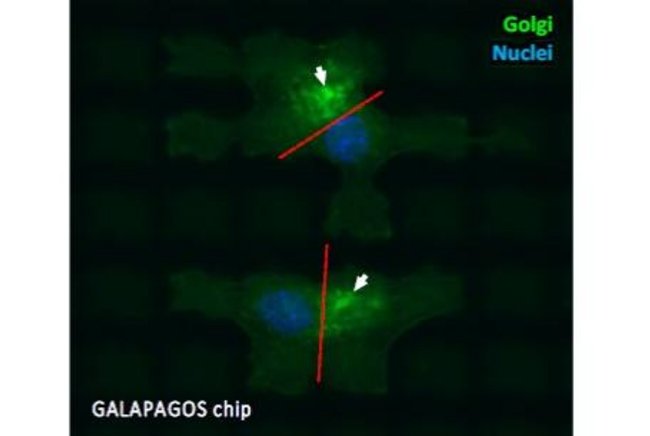New grant to fund research on the inner workings of the cell
HFSP research grant awarded to Jan de Boer and international colleagues to study the Golgi complex.

Prof. Jan de Boer and collaborators based in the US and Italy have received a Human Frontier Science Program (HFSP) research grant worth more than one million euros to study the mechanisms that cells use to build the Golgi complex, a central hub in the cellular membrane that plays a key role in directing proteins and lipids towards their final destinations in cells. With this grant, the researchers are seeking to find a way to control the transcriptional program of the Golgi complex by bioengineering specific patterns and/or materials.
The Golgi complex, which is named after the Italian scientist Camillo Golgi who first identified it, is a dynamic organelle that can adapt to increased cargo loads via volume and structural changes. Such changes regularly require the biogenesis of new Golgi components.
For this newly-funded HFSP project, researchers from TU Eindhoven, Wadsworth Center Albany (USA) and Telethon Institute of Genetics and Medicine (Italy) will combine their expertise in an effort to understand how the cell regulates the transcription processes central to the building the Golgi complex from scratch.
Laser surgery on the cell
The research team are seeking to design and optimize an experimental system to specifically investigate the process behind Golgi biogenesis. They plan to let stem cells grow on surfaces with specifically designed patterns, which make sure that the cell nucleus and Golgi system are separated. The surface forces the cells to take a shape in which the Golgi system and nucleus can’t grow next to each other, enabling the researchers to cut away the part of the cell with the Golgi system using a laser. The cell will survive this Golgi-removing surgery, however it will have to start making a new Golgi system as soon as possible. Observing this process, will reveal to the researchers which genes are involved and shed new light on the Golgi system.
This HFSP grant enables the researchers to fund a PhD student at each of the three research institutions: TU Eindhoven, Wadsworth Center Albany and Telethon Institute of Genetics
Jan de Boer is full professor at the department of Biomedical Engineering, where he leads the research group BioInterface Science. He is an experienced University Professor and Chief Scientific Officer with a demonstrated history of working in both academia and biotech. Jan is interested in the molecular complexity of cells and how molecular circuits are involved in cell and tissue function.
The Human Frontier Science Program is an international program of research support implemented by the International Human Frontier Science Program Organization (HFSPO) based in Strasbourg, France. Its aims are to promote intercontinental collaboration and training in cutting-edge, interdisciplinary research focused on the life sciences.